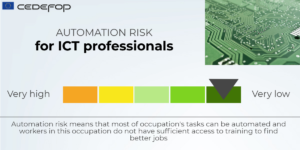A new report predicts an additional 395,000 new jobs in ICT occupations by 2030. Portugal and Lithuania are expected to see the highest rates of growth (57 per cent) followed by Ireland, Poland, Estonia and Bulgaria (29 per cent) – far above the predicted EU average of 11 per cent.
CEDEFOP, the independent EU agency for developing skills policy, and Skills Panorama, the analysis unit charged with turning labour market data into accurate and timely intelligence, have delivered their latest insights into skill needs across the European Union and at a country level.
Key facts:
- Around 3.5 million people were employed as ICT professionals in 2018. Employment in the occupation grew by just over 29 per cent between 2006 and 2018.
- Employment is projected to grow by a further 11 per cent over the period 2018 to 2030. In doing so, an additional 395,000 new jobs will be created. If one adds this to the number of people who are expected to leave the occupation over the same period for reasons such as retirement – an estimated 1.2 million – then it is clear to see that there will be a substantial demand for people to work in the occupation. There will be 1.6 million ICT professional jobs that will need to be filled between 2018 and 2030.
- ICT professionals are highly-qualified: in 2018, 71 per cent had a high-level qualification which is expected to increase to 74 per cent in 2030. Those with medium level qualifications accounted for 25 per cent of the workforce in 2018 and this will remain more or less unchanged to stand at 23 per cent in 2030.
- In the workplace, using ICT, being autonomous, gathering and evaluating information are the most important tasks of ICT professionals.
- ICT is a general-purpose technology, and so changes and disruptions in the economy can have significant influence on the future skill demands for these professionals.
The report also looks at a range of drivers which will influence skills changes such as job automation – with ICT professionals among the very few professions at low risk of automation.
Risk of Automation: As a part of its Digitalisation and future of work project, CEDEFOP estimates the risks of automation for occupations. The most exposed occupations are those with significant share of tasks that can be automated – operation of specialised technical equipment, routine or non-autonomous tasks – and those with a small reliance on communication, collaboration, critical thinking and customer-serving skills.
The risk of automation is further accentuated in occupations where employees report little access to professional training that could help them to cope with labour market changes.

How can these skill needs be met?
To promote mobility of ICT professionals across sectors in the economy and/or EU Member States, the European Commission offers eCF – the eCompetence Framework a “common European framework for ICT professionals in all industry sectors”.
The Irish Computer Society is pioneering work in this area through the provision of CareerPlus free to members enabling Irish-based ICT professionals to record and manage their continuous professional development. CareerPlus is built on the eCF framework meaning all ICS members will have a skills profile recognised in all EU member states.
For more information, visit the CEDEFOP website.






